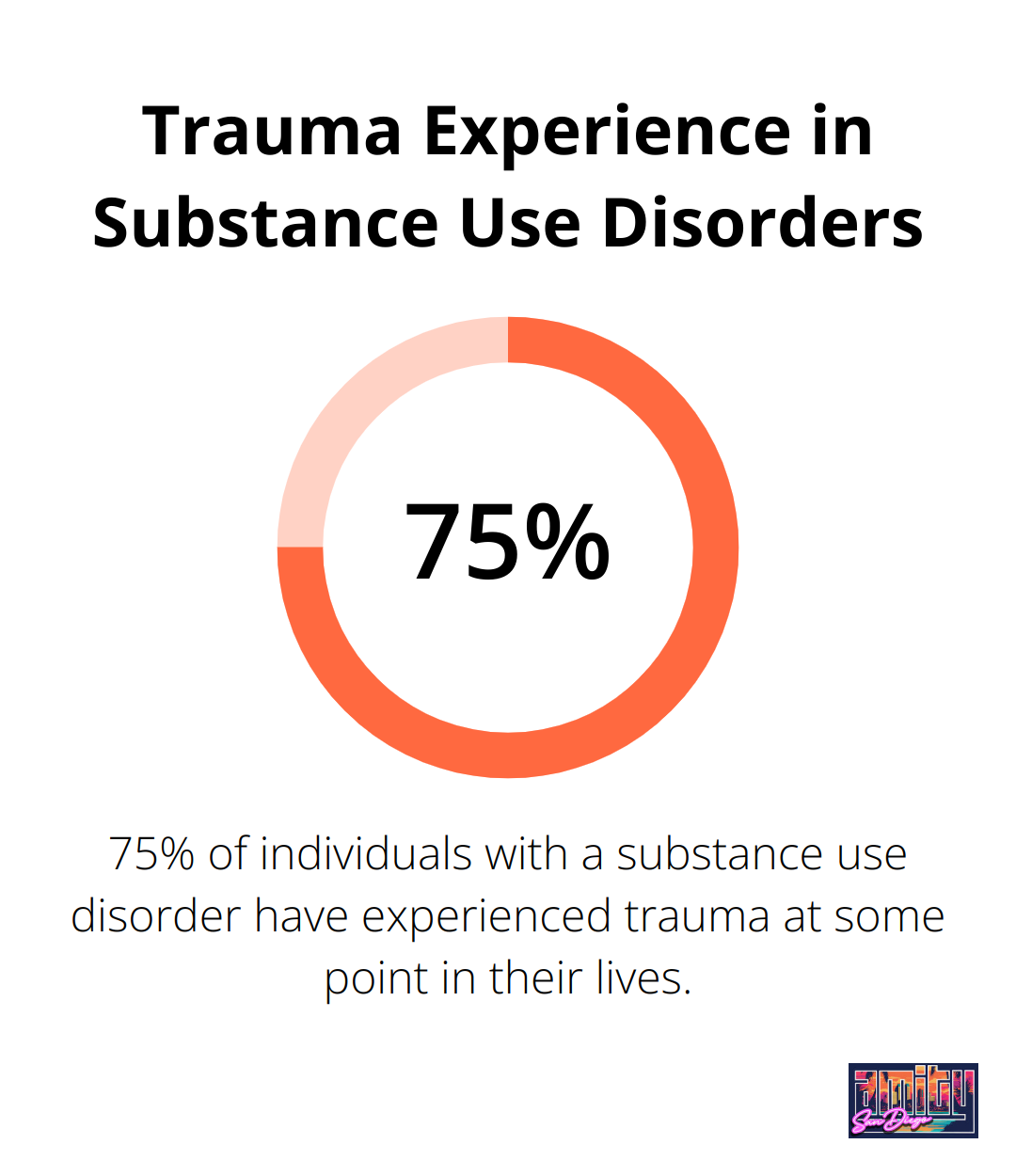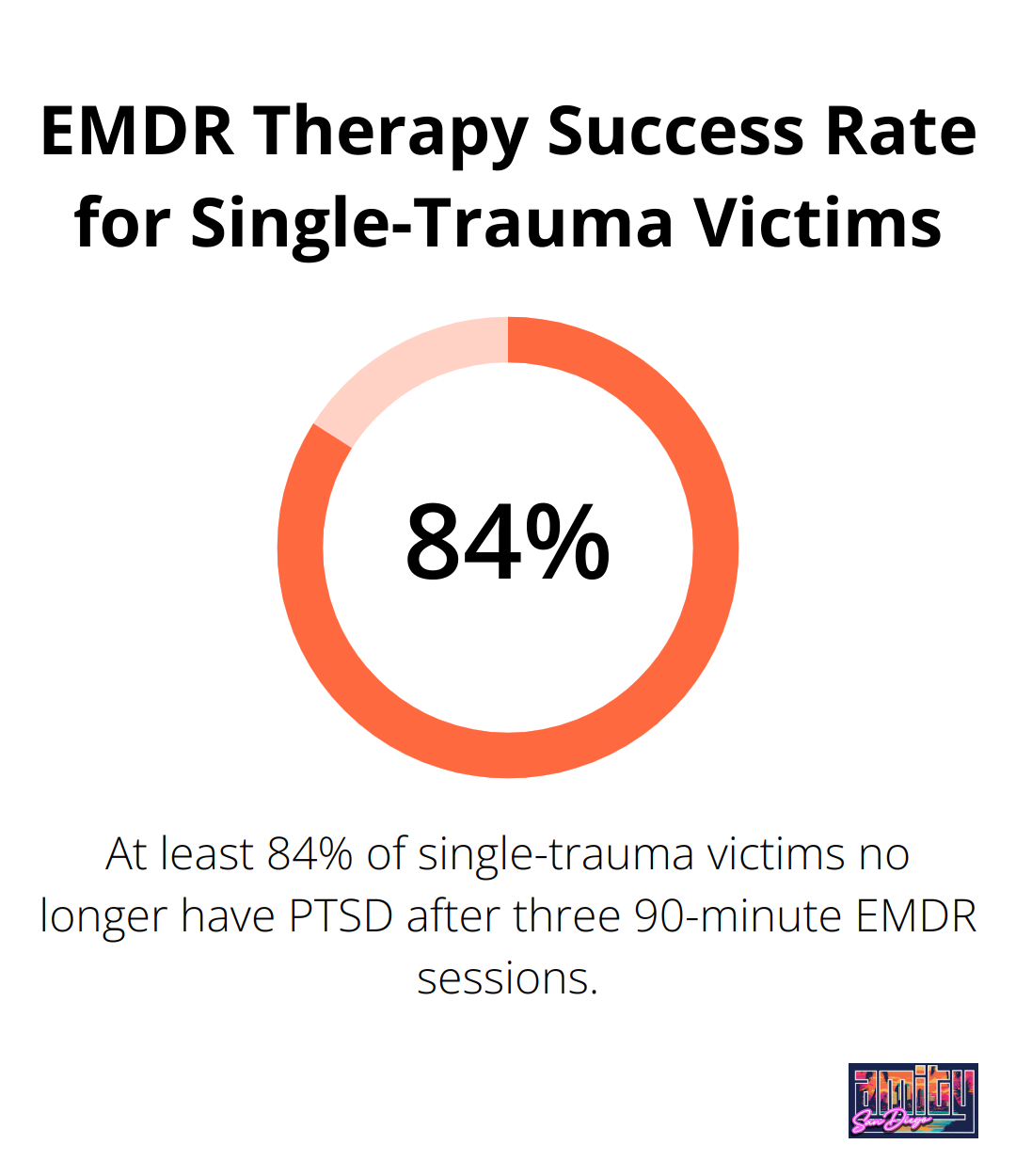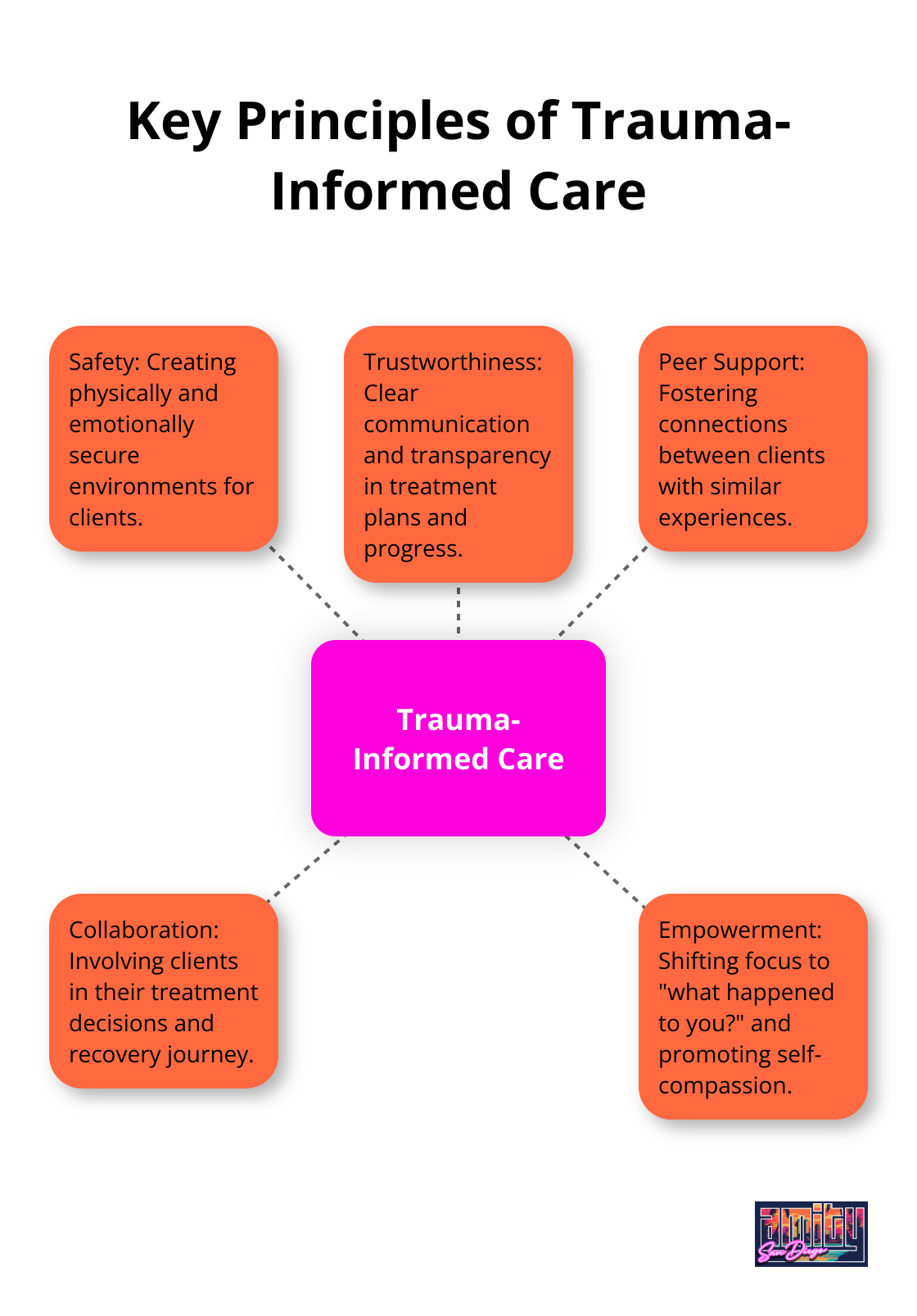At Amity San Diego, we’ve seen firsthand how trauma can fuel addiction and complicate recovery.
Residential trauma treatment programs offer a powerful solution for those struggling with both trauma and substance abuse. These specialized programs provide a safe, supportive environment where individuals can heal from past experiences while addressing their addiction.
We’ll explore how trauma-informed care is revolutionizing addiction treatment and why it’s crucial for lasting recovery.
What Is Trauma-Informed Care?
The Foundation of Trauma-Informed Care
Trauma-informed care revolutionizes addiction treatment by recognizing trauma’s widespread impact on individuals seeking recovery. This approach acknowledges that many people struggling with substance abuse have experienced trauma, which often plays a significant role in their addiction.
The Substance Abuse and Mental Health Services Administration (SAMHSA) reports that approximately 75% of individuals with a substance use disorder have experienced trauma at some point in their lives. This statistic underscores the critical need for trauma-informed approaches in addiction treatment.

Key Principles in Practice
Several key principles of trauma-informed care shape effective treatment programs:
- Safety: Treatment centers create environments where clients feel physically and emotionally secure. This includes thoughtful facility design and staff interactions that promote a sense of safety.
- Trustworthiness and Transparency: Clear communication about treatment plans, expectations, and progress builds trust with clients.
- Peer Support: Connections between clients who share similar experiences foster a supportive community within treatment programs.
- Collaboration: Involving clients in their treatment decisions empowers them to take an active role in their recovery journey.
The Impact on Addiction Treatment
Trauma-informed care addresses the underlying issues that often fuel substance abuse. By focusing on healing trauma, treatment centers can help break the cycle of addiction more effectively.
Integrating Trauma-Informed Care
Many treatment centers have integrated these principles into every aspect of their programs. The goal is to provide a healing environment where individuals can safely confront their trauma, develop healthy coping mechanisms, and build a strong foundation for lasting recovery.
The Role of Staff Training
Effective trauma-informed care requires ongoing staff training. Treatment centers (such as Amity San Diego) often invest in continuous education to ensure their teams understand the latest research and best practices in trauma-informed care.
This commitment to staff development enhances the quality of care and creates a more supportive environment for clients. As we move forward, let’s explore the specific components that make trauma-informed residential programs effective in addressing both addiction and underlying trauma.
What Makes Trauma-Informed Residential Programs Effective?
At Amity San Diego, we recognize the importance of a well-structured, trauma-informed approach in residential treatment programs. These programs address both addiction and underlying trauma simultaneously, providing a comprehensive healing experience.
Thorough Assessment and Personalized Care
The recovery journey starts with a detailed intake process. This process goes beyond simple form-filling; it seeks to understand each person’s unique story. Our intake process typically lasts 2-3 hours, allowing us to build a complete picture of a client’s history (including any traumatic experiences that may have contributed to their addiction).
This comprehensive assessment results in a personalized treatment plan. Recent studies have shown that trauma-informed care programs can be delivered effectively, with approximately 88% adherence to the model and 48% of clients completing the full treatment program.
Evidence-Based Therapies for Trauma and Addiction
Effective trauma-informed programs rely on proven therapeutic methods. Eye Movement Desensitization and Reprocessing (EMDR) has shown remarkable results in treating trauma. Studies report that 84-90% of single-trauma victims no longer have PTSD after only three 90-minute EMDR sessions.

Cognitive Behavioral Therapy (CBT) and Dialectical Behavior Therapy (DBT) also form cornerstones of trauma-informed care. These therapies help clients develop coping skills and change harmful thought patterns.
Creating a Safe and Supportive Environment
The physical and emotional safety of clients takes precedence in trauma-informed care. This involves creating secure spaces and implementing policies that respect boundaries. For example, we maintain a strict confidentiality policy and provide private therapy rooms to ensure clients feel comfortable sharing their experiences.
Staff training plays a vital role in maintaining this safe environment. All staff members, from therapists to support staff, should receive training in trauma-informed care principles. This comprehensive approach ensures that every interaction a client has within the facility supports their recovery and avoids triggering responses.
Holistic Approaches to Healing
Trauma-informed care acknowledges that healing involves more than addressing psychological symptoms. Holistic approaches that incorporate physical health, nutrition, and mindfulness practices can significantly enhance recovery outcomes.
Yoga and meditation have shown to reduce symptoms of PTSD and substance cravings. A study concluded that a program involving yoga and meditation might be an effective preventive program for nicotine-use disorders among Indian adolescents.
Nutrition also plays a key role. Many individuals with trauma and addiction histories have neglected their physical health. A balanced nutrition plan can improve mood, energy levels, and overall well-being, supporting the recovery process.
The combination of these components – comprehensive assessment, evidence-based therapies, a safe environment, and holistic approaches – provides a powerful framework for healing in trauma-informed residential programs. This integrated approach addresses the complex interplay between trauma and addiction, offering clients the best opportunity for long-term recovery and a healthier, more fulfilling life. As we explore further, we’ll examine the specific benefits that trauma-informed residential treatment brings to individuals seeking recovery.
How Trauma-Informed Care Improves Recovery
Breaking the Cycle of Addiction
Trauma-informed care tackles the root causes of addiction. A study by ZC Walter in 2025 found that clients receiving trauma-informed care had significant reductions in substance involvement, depression, anxiety, and PTSD.
This approach helps clients understand the link between their past experiences and current behaviors. A client might realize their alcohol use started as a coping mechanism for childhood trauma. This insight often acts as a powerful motivator for change.
Building Trust and Engagement
Trauma-informed care creates an environment where clients feel safe and understood. This leads to higher engagement rates in treatment. A 2024 study by M Wells estimated an overall treatment completion rate of 59%, with experimental studies reporting higher rates of completion than observational studies.
Clients in trauma-informed programs tend to open up more about their experiences. This honesty proves crucial for effective treatment. One client shared, “For the first time, I felt like someone understood what I’d been through. It made me want to keep coming back.”
Preventing Re-traumatization
Traditional addiction treatment can sometimes trigger trauma responses unintentionally. Trauma-informed care actively works to prevent this. A study by S Grossman in 2021 expanded the definition of trauma to include the impact of collective and structural elements on health and well-being.
This approach involves careful consideration of every aspect of the treatment environment. For instance, many trauma-informed programs avoid using restraints or isolation rooms (which can be triggering for many trauma survivors). Instead, they focus on de-escalation techniques and creating calming spaces.
Personalized Treatment Plans
Trauma-informed care recognizes that each person’s experience with trauma and addiction is unique. Treatment plans are tailored to address individual needs and experiences. This personalization (which often includes a mix of therapies and interventions) increases the likelihood of successful recovery.
Empowering Clients
A key aspect of trauma-informed care involves empowering clients to take an active role in their recovery. This approach shifts the focus from “what’s wrong with you?” to “what happened to you?” It helps clients understand their behaviors as adaptations to trauma rather than character flaws. This shift in perspective often leads to increased self-compassion and motivation for change.

Final Thoughts
Trauma-informed care revolutionizes addiction treatment by addressing the complex relationship between past experiences and substance use. Residential trauma treatment programs create safe environments and use evidence-based therapies to help individuals heal from addiction and underlying trauma. This approach leads to improved treatment outcomes, reduced relapse rates, and a stronger foundation for lasting sobriety.
Trauma-informed care empowers individuals to reclaim their lives and build healthier relationships. The skills and insights gained through this approach support recovery long after treatment ends. Clients develop a deeper understanding of their behaviors, build resilience, and learn healthy coping mechanisms (which are essential for long-term success).
Amity San Diego offers personalized, trauma-informed care in a compassionate setting. Our team of experienced professionals guides clients through every step of their recovery journey. Take the first step towards healing today by seeking addiction treatment San Diego with a trauma-informed approach.



